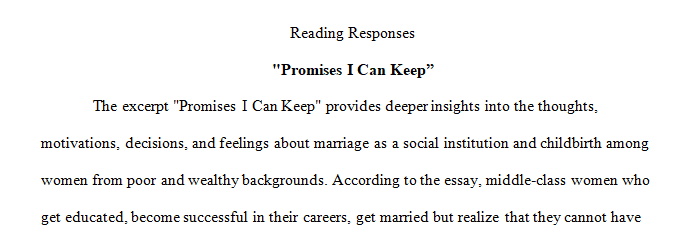
How can we account for the decoupling of marriage and motherhood among low income women?
Reading Responses
You should write one page for these questions( first reading material)
Reading 8 – Edin.Kefalas. Promises I Can Keep: Why Poor Women Put Motherhood Before Marriage This is an excerpt from the authors’ book with the same title. The reading presents research data gathered for over three years in inner city neighborhoods of Philadelphia, PA and Camden, NJ during the early-2000s. The reading is very rich in description – exactly how great ethnographic research should be done. The authors talk about the concepts of marriage and motherhood in these low income areas. They noticed a disjoint. If middle class women get married but can’t have kids, low income women don’t get married but have kids. How can we account for the decoupling of marriage and motherhood among low income women?What kind of response does a middle class woman elicit; one who gets educated, becomes established in a career, gets married, wants to have kids, but realizes she can’t have any?
What kind of response does a low income woman who has kids out of wedlock elicit?
What are some reasons why poor women choose to have kids without being married? Do you believe the stories women tell?
If having a kid as a single parent has negative consequences (this is a very big assumption by the way so feel free to dispute it), what can we do to prevent the intergenerational cycle?
and write one pages for these questions( second reading material)
Reading 9 – Weber. The Protestant Ethic and the Spirit of Capitalism
This is a classical piece on the influence of religion by one of the founders of sociology, Max Weber. Unlike Marx who sees religion as a tool in the hands of bourgeoisie, Weber sees religion as a foundation of economic systems. In this selection, he argues that the Protestant movement which originated in Germany during the XV century, provided the seeds of the capitalist enterprise. Notions of hard work, frugality, a constant drive for profit, not a moment to waste – pillars of capitalism – have their origins precisely in the religious movements of 600 years ago. The reading is a little dense but consider these questions to guide your thinking.
What is the idea of a “calling” and the concept of predestiny?
In the middle ages, the author argues, prayer took precedence over work (you worked a little and prayed a lot). In modern ages, work took precedence over prayer (you worked a lot and prayed when you had time). How important is this shift?
Do you agree with the author’s claim that, during the modern ages, for the first time in the history of societies, work and your duty before God were one and the same?
What is the difference between a Catholic and a Protestant? How does a Catholic know what will happen in afterlife; how can a Catholic ensure a path to Heaven? What about a Protestant?
Does contemporary capitalism need religion to thrive?
Subject: English
Answer preview……………………………
 apa 747 words
apa 747 words